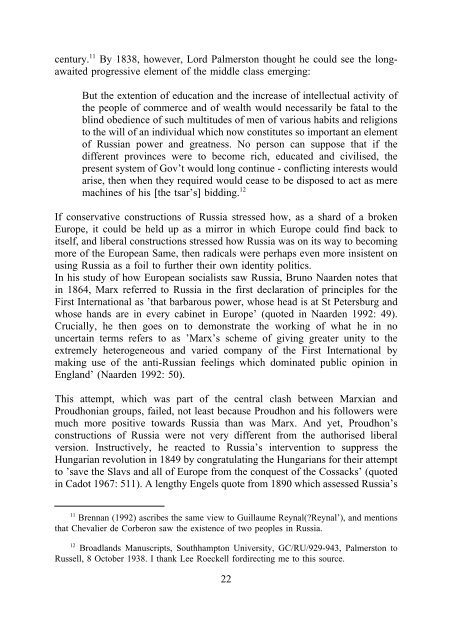RUSSIA AS EUROPE'S OTHER Iver B. Neumann European ...
RUSSIA AS EUROPE'S OTHER Iver B. Neumann European ...
RUSSIA AS EUROPE'S OTHER Iver B. Neumann European ...
You also want an ePaper? Increase the reach of your titles
YUMPU automatically turns print PDFs into web optimized ePapers that Google loves.
century. 11 By 1838, however, Lord Palmerston thought he could see the longawaited<br />
progressive element of the middle class emerging:<br />
But the extention of education and the increase of intellectual activity of<br />
the people of commerce and of wealth would necessarily be fatal to the<br />
blind obedience of such multitudes of men of various habits and religions<br />
to the will of an individual which now constitutes so important an element<br />
of Russian power and greatness. No person can suppose that if the<br />
different provinces were to become rich, educated and civilised, the<br />
present system of Gov’t would long continue - conflicting interests would<br />
arise, then when they required would cease to be disposed to act as mere<br />
machines of his [the tsar’s] bidding. 12<br />
If conservative constructions of Russia stressed how, as a shard of a broken<br />
Europe, it could be held up as a mirror in which Europe could find back to<br />
itself, and liberal constructions stressed how Russia was on its way to becoming<br />
more of the <strong>European</strong> Same, then radicals were perhaps even more insistent on<br />
using Russia as a foil to further their own identity politics.<br />
In his study of how <strong>European</strong> socialists saw Russia, Bruno Naarden notes that<br />
in 1864, Marx referred to Russia in the first declaration of principles for the<br />
First International as ’that barbarous power, whose head is at St Petersburg and<br />
whose hands are in every cabinet in Europe’ (quoted in Naarden 1992: 49).<br />
Crucially, he then goes on to demonstrate the working of what he in no<br />
uncertain terms refers to as ’Marx’s scheme of giving greater unity to the<br />
extremely heterogeneous and varied company of the First International by<br />
making use of the anti-Russian feelings which dominated public opinion in<br />
England’ (Naarden 1992: 50).<br />
This attempt, which was part of the central clash between Marxian and<br />
Proudhonian groups, failed, not least because Proudhon and his followers were<br />
much more positive towards Russia than was Marx. And yet, Proudhon’s<br />
constructions of Russia were not very different from the authorised liberal<br />
version. Instructively, he reacted to Russia’s intervention to suppress the<br />
Hungarian revolution in 1849 by congratulating the Hungarians for their attempt<br />
to ’save the Slavs and all of Europe from the conquest of the Cossacks’ (quoted<br />
in Cadot 1967: 511). A lengthy Engels quote from 1890 which assessed Russia’s<br />
11 Brennan (1992) ascribes the same view to Guillaume Reynal(?Reynal’), and mentions<br />
that Chevalier de Corberon saw the existence of two peoples in Russia.<br />
12 Broadlands Manuscripts, Southhampton University, GC/RU/929-943, Palmerston to<br />
Russell, 8 October 1938. I thank Lee Roeckell fordirecting me to this source.<br />
22

















